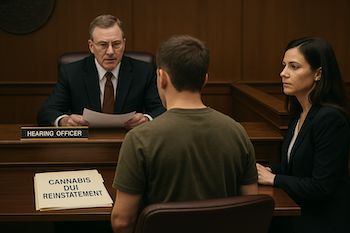 Cannabis DUIs in Illinois have become a growing concern with legalization, complicating the driver's license reinstatement process due to strict impairment standards and revocation rules. As an Illinois reinstatement lawyer based in Joliet, with over 20 years of criminal law experience as a former Will County prosecutor, I've seen how THC-related DUIs lead to prolonged revocations for clients in Will County, even for medical users. Under 625 ILCS 5/11-501, driving with THC levels over 5 ng/ml in blood (or 10 ng/ml in other fluids) or observable impairment constitutes a DUI, resulting in the same penalties as alcohol DUIs: 1-year revocation for first offenses, escalating to 5+ years for repeats. In 2025, with the Cannabis Regulation and Tax Act's ongoing effects, the SOS requires the same rehabilitation proofs—evaluations, treatment, and BAIID if mandated—but cannabis cases often face extra scrutiny on impairment evidence. Understanding these challenges is vital, as unresolved THC DUIs can block reinstatement, leading to denials, appeals, and extended non-driving periods; strategic preparation can clear the path to getting back on the road legally.
Cannabis DUIs in Illinois have become a growing concern with legalization, complicating the driver's license reinstatement process due to strict impairment standards and revocation rules. As an Illinois reinstatement lawyer based in Joliet, with over 20 years of criminal law experience as a former Will County prosecutor, I've seen how THC-related DUIs lead to prolonged revocations for clients in Will County, even for medical users. Under 625 ILCS 5/11-501, driving with THC levels over 5 ng/ml in blood (or 10 ng/ml in other fluids) or observable impairment constitutes a DUI, resulting in the same penalties as alcohol DUIs: 1-year revocation for first offenses, escalating to 5+ years for repeats. In 2025, with the Cannabis Regulation and Tax Act's ongoing effects, the SOS requires the same rehabilitation proofs—evaluations, treatment, and BAIID if mandated—but cannabis cases often face extra scrutiny on impairment evidence. Understanding these challenges is vital, as unresolved THC DUIs can block reinstatement, leading to denials, appeals, and extended non-driving periods; strategic preparation can clear the path to getting back on the road legally.
How Cannabis DUIs Lead to License Revocation
A cannabis DUI revocation mirrors alcohol, but THC lingers in the system (up to 30 days for occasional users), making defenses harder without expert help. For first offenses, expect a 1-year revocation; aggravated cases (e.g., high THC or injury) can mean felonies with 2+ years. In Will County, Joliet arrests often stem from odor or erratic driving, with blood tests as key evidence. Medical marijuana cardholders aren't exempt—impairment is the focus, and refusals add 12-month suspensions. In 2025, SOS hearings demand Uniform Report evaluations classifying cannabis risk, with high-risk levels requiring 75 hours of treatment plus continuing care.
The Reinstatement Process for Cannabis DUI Revocations
To reinstate:
- Serve Revocation Period: check your Notice for eligibility.
- Complete Evaluation: Get a Uniform Report (<6 months old) addressing cannabis use; complete treatment (10-75 hours based on risk).
- Gather Evidence: Submit sobriety proofs (e.g., abstinence logs, character letters), BAIID reports if required, and SR-22 insurance.
- Request Hearing: Informal for firsts (no fee); formal ($50) for repeats—virtual options available.
- Testify and Pay: Provide consistent testimony on rehabilitation; $500 fee upon approval.
In 2025, electronic submissions speed packets, but cannabis-specific denials (e.g., unresolved use) are common—appeal within 35 days.
Strategies to Overcome Cannabis DUI Challenges
Emphasize medical necessity or non-impairment (THC metabolites vs. active levels); challenge blood test timing. For medical users, argue therapeutic compliance. Expert representation boosts approval by preparing testimony and addressing SOS concerns.
Why Consult an Illinois Reinstatement Lawyer for Cannabis DUIs?
Cannabis DUIs add layers to reinstatement—professional guidance ensures compliance. At Illinois Reinstatement Lawyers, led by Jack L. Zaremba, we specialize in THC-related revocations, evaluations, and hearings statewide.
Contact us today for a free consultation at our contact page or call (815) 740-4025. Reinstate with confidence.

